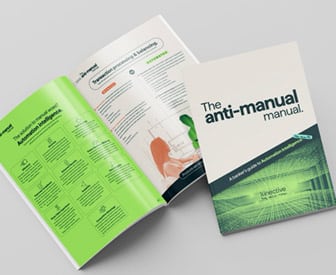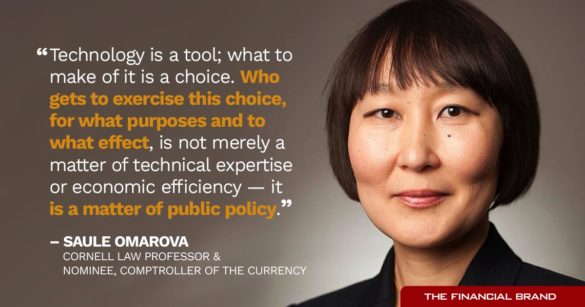The Biden administration’s nominee for the post of Comptroller of the Currency will literally give national bankers a run for their money.
In testimony, recorded comments and academic papers on banking and fintech, Cornell Law Professor Saule Omarova (pron. “Sow-Lee Oh-Mah-Row-Va”) exhibits all the traits of a card-carrying skeptic.
Omarova disputes the underpinnings of traditional and fintech finance, and can speak quite bluntly about both. She shows a skepticism about innovation when she feels it lacks a point or justification. And, at least on paper, she would have no problem rooting up the whole financial garden and replanting it according to a much different plan.
She appears to hold public institutions on something of a pedestal and regards private financial institutions, especially very large banks, with suspicion.
And she wields references to the financial crisis that led to the Great Recession like a sharp poker, ready to skewer anyone’s argument that wraps itself up in promises for the public good when she suspects they are chiefly about private gain.

The unfair advantage for financial brands.
Offering aggressive financial marketing strategies custom-built for leaders looking to redefine industry norms and establish market dominance.

Improve Your Business Outcomes Through Data & Analytics
Gain centralized access to the credit bureaus and 20+ alternative data sources. Leverage advanced analytics to optimize marketing campaigns and loan decisions.
Read More about Improve Your Business Outcomes Through Data & Analytics
Omarova is a banking law geek who holds some essential principles, such as the separation of banking and commerce, as sacrosanct. Dry as that sounds, Omarova, who was born in Kazakhstan, also appears to have a self-deprecating sense of humor.
When interviewed for the MSNBC podcast series “Why Is This Happening?” Omarova was asked by host Chris Hayes about her origins and arrival in the U.S.
Near the end of the Gorbachev era in the U.S.S.R., she recounted, she had been an undergraduate student at Moscow State University. She won a seat in an exchange program with the University of Wisconsin at Madison for a single semester. During that time the Soviet Union collapsed.
“So there I was, a student without anywhere to go back to,” recalls Omarova. “I was very worried about what was going to happen. So I stayed to do my Ph.D. in political science. But frankly, to this day, I feel guilty for having left the country at such a momentous time, because obviously they couldn’t hold it together without me.”
A bit of dry wit will help Omarova with the challenges at the Office of the Comptroller of the Currency, as she enters the approval process in the Senate with a trail of work that will manage to not make her popular with many in banking. In a member newsletter announcing the late September 2021 nomination, the Bank Policy Institute stated that Omarova “has expressed views on the financial system that set her up for a rocky confirmation process in the closely divided Senate.”
To put it succinctly:
- Omarova has espoused nationalization of the retail banking system — think of the Federal Reserve offering consumer checking accounts.
- She has proposed the full migration of all demand deposits, including corporate uninsured accounts, onto the Fed’s balance sheet.
- She has pushed for creation of a “National Investment Authority” that could replace much of the capital and infrastructure framework of the U.S.
- She has more than raised an eyebrow of concern over the trustworthiness of fintech and big tech. But she also distrusts major banks that she thinks enjoy too much power and because of “too big to fail,” can stick the bill for screwups to the taxpayer.
- She questions the fundamental information sharing that the U.S.’ market-driven approach to open banking depends on.
- She has qualms about cryptocurrency, except in the form of central bank digital currencies (CBDC), which she sees as a countermeasure to the growth of private cryptocurrencies.
- She is quick to point to hucksterism that highlights only the good in new developments, without showing the underside, and will quickly equate such talk with the boosterism that went on prior to the financial crisis in favor of financially engineered securities and other practices stoked by greed.
- She tends to scoff at the classic understanding of the role of traditional banks in the U.S. economy, essentially holding that the wealth and commerce of the nation derives from its citizens and entities like the Fed.
Her nomination was cheered by Senate Banking Chairman Sherrod Brown (D.-Ohio). He said that “her experience as a policymaker, in the private sector, and in academia will allow her to work with stakeholders across our financial system to ensure the economy works for everyone, and to protect our economic recovery from the risky activities of Wall Street and other bad actors.”
However, Brown’s opposite number, Ranking Member Pat Toomey (R.-Pa.) said Omarova has “advocated for ‘effectively end[ing] banking as we know it.’ In light of these, and other extreme leftist ideas, I have serious reservations about her nomination.”
Update: Omarova’s confirmation hearing with the Senate Banking Committee was set for Nov. 18.
After getting her Ph.D., Omarova went to Northwestern University School of Law for her J.D. Today, Omarova is Director of the Program on the Law and Regulation of Financial Institutions and Markets at Cornell University’s law school. In private practice she worked for about five years in the Financial Institutions Group of Davis, Polk & Wardwell. She subsequently spent a year as Special Advisor for Regulatory Policy to the Under Secretary for Domestic Finance at the Treasury Department during the second term of President George W. Bush. This took place in 2006-2007, the beginning of the emergence of the financial crisis.
The following summarizes, chiefly through quotations from statements and papers of Omarova’s, the often-detailed observations that she has made about the financial system as it is and as she would like to see it. (Update: After a month of controversy in the industry after the administration’s “intention to nominate” was announced, Omarova’s name was formally sent to Capitol Hill in early November 2021.)
Read More About the regulatory scene in Washington, D.C.:
- Bank Regulator Sees Cryptocurrency Innovation Creating ‘Fool’s Gold’
- Regulators’ Revenge: Fintechs’ Success Spurs Calls for More Oversight
Rethinking Banking as ‘The People’s Ledger’
In her 2021 draft paper “The People’s Ledger: How to Democratize Money and Finance the Economy,” she lays out the skeleton of a plan to redraw “the currently dysfunctional U.S. financial system by reimagining its fundamental structure and redesigning its operation.”
“The Fed’s entire balance sheet should be redesigned to operate as what it calls the ‘People’s Ledger:” the ultimate public platform for both modulating and allocating the flow of sovereign credit and money in the national economy. On the liability side, the [paper] envisions the ultimate ‘end-state’ whereby central bank accounts fully replace — rather than compete with — private bank deposits.”
“… all of the Fed’s key monetary policy choices and their outcomes would be reflected on the liability side of its balance sheet, leaving the asset side free to serve as the tool of the economy-wide credit allocation. More fundamentally, the proposed restructuring of the Fed’s balance sheet would democratize not only access to financial services but the very process of generation and allocation of financial resources. It would therefore directly impact not only the banking industry but also ‘shadow banking’ and capital markets.”
Her blueprint makes some provision for participation by community banks and smaller credit unions, but apparently chiefly as agents of the new Fed system, receiving fees for their services.
From Senate testimony in 2018 in reaction to the Trump administration’s blueprint for financial reform:
“The increasing concentration of economic power in a small club of corporate giants is a direct threat to American democracy. It perpetuates and exacerbates deep socio-economic inequality, which inevitably undermines political order premised on ideals of equal participation and voice. Big corporations’ ability to ‘buy’ political influence fundamentally corrupts political process and corrodes public confidence in the democratic system as a whole This is an unacceptably high societal price for the personal convenience of accessing one’s bank accounts and digital wallets via a single iPhone click.”

Fintech and the Role of Technology
“Fintech is visibly ‘disrupting’ traditional methods of delivering financial services and conducting financial transactions,” wrote Omarova in her paper “New Tech V. New Deal: Fintech as a Systemic Phenomenon.” She added: “Less visibly, it is also changing the way we think about finance and envision its future trajectory.”
It is fair to say that many aspects of fintech are unregulated, at least in the formative stages. Omarova sees some attraction to an end to that innovation freedom, by requiring private firms to demonstrate to regulators that each product they intend to market meets three tests. These are:
- Economic purpose test — How would it be useful socially and commercially?
- Institutional capacity test — Can the firm proposing the product handle its risks and monitor how it affects relevant markets?
- Systemic effects test — Can the firm demonstrate that “the proposed product would not pose an unacceptable risk of increasing systemic vulnerability and otherwise will not raise significant public policy concerns”?

The New AI: A Banker’s Guide to Automation Intelligence
Manual tasks across channels is costly. And while AI is hot, there’s a simpler way to bring efficiency that many bankers have overlooked.
Read More about The New AI: A Banker’s Guide to Automation Intelligence

Creating A Community with CQRC’s Branch Redesign
Find out how SLD helped CQRC Bank to create the perfect harmony of financial services, local culture, and the human touch in their branch transformation.
Read More about Creating A Community with CQRC’s Branch Redesign
Cryptocurrencies versus CBDCs
From Senate testimony in 2018:
“It is worth emphasizing that advances in technology are increasingly enabling private market participants to create tradable crypto-assets effectively out of thin air. These crypto-assets — digital tokens or bits of data representing some value — can have such an attenuated connection to productive activity in the real economy as to be practically untethered from it. By potentially rendering the financial system entirely self-referential, this type of unchecked private sector ‘innovation’ can fundamentally undermine — rather than promote — the long-term growth on the part of the American economy.
From her paper “Technology v. Technocracy: Fintech as a Regulatory Challenge”:
“[Central bank digital currency] is a response to the increasing threat private cryptocurrencies pose to financial stability and monetary sovereignty. An operational CBDC would either replace privately issued crypto-coins, including the increasingly popular stablecoins, or render them far less ubiquitous in financial transactions.’
Read More: Are Cryptocurrencies Coming to Everybody’s Checking Accounts?
Regarding Data Sharing Between Banks and Fintechs
From her 2018 Senate testimony:
“Simply relaxing existing bank regulations in order to allow wholesale migration of the highly sensitive and valuable financial information currently controlled by banks to data aggregators, cloud providers, and other fintech companies would expose consumers to potentially massive data privacy and safety risks. Rather than gaining meaningful control over their personal financial data, American consumers will be an easy target for unscrupulous salesmen of the digital era.
“A prudent public policy approach to safe and secure financial data-sharing in the digital age requires a deeper and more balanced analysis of these risks, as well as the means of preempting them.”








